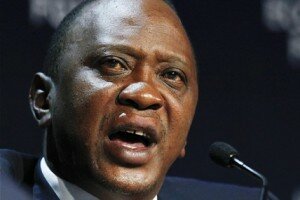Uhuru Kenyatta (forbes.com)
The reaction followed a statement by Botswana’s Foreign Affairs Minister, Phandu Skelemani, in an interview, saying the country would not look kindly on Kenyatta refusing to attend his trial at the International Criminal Court (ICC). The president-elect has requested to appear via video link.
“If he refuses to go (to The Hague), then we have a problem,” Skelemanin said. “That means that they do not know the rule of law. You can’t establish a court and refuse to go when it calls you. If he refuses, he won’t set foot here.”
Kenyans used #SomeoneTellBotswana and #SomeoneTellKenya hashtags on Twitter to express their anger at the minister’s statements.
#SomeonetellBotswana that kenya does not need them.You humiliate our president then leave our country!
— Nonze N (@Nonze) March 13, 2013
#SomeoneTellBotswana we werent planning on coming
— Victor (@Ronoisreal) March 13, 2013
#SomeoneTellBotswana we dont need anything from them.
— Hillary Ngrtich (@hilltich) March 13, 2013
The Twitter storm forced Skelemani to retract his statement.
“I apologise to the Kenyan people for misunderstanding my earlier statement,” he said. “I wish to maintain that Kenya and Botswana have always worked together and nothing will distract that.
“I would also wish the newly elected President of Kenya and his government all the best in the new responsibility of governing Kenya.”
He however urged Kenyatta and his deputy William Ruto to cooperate with the ICC to prevent Kenya from being alienated by the international community.
Social media is becoming increasingly powerful on the African content, providing citizens of different countries with a powerful avenue to vent their dissatisfaction on some of the issues facing them.
























